A few years ago, I began compiling what I affectionately call my “goofy” synchronicity stories. (Synchronicity was initially defined by Carl Jung to represent meaningful coincidences—“causally unrelated” events that happen near the same time and carry the same meaning.)
I noticed that often, these independent events don’t happen at the same time or within a few moments of each other. Instead, the events that share a similar meaning happen a few hours apart and perhaps in different locations. For those situations, I coined the term “sequencity” since the independent events of similar meaning happen more sequentially than synchronously. I figure if Carl Jung can make up terms, so can I. To me, whenever I experience sequencity, it reinforces the deeper meaning and connection that is part of life.
In late June of this year, I had a chance to speak with Robert Whitaker via Zoom when he graciously agreed to be the first guest on my YouTube channel, Bellyflopping Into Mysticism.
As part of the preparation for that conversation, I reviewed some of the notes that I’d made when I read his books a couple years ago. I noticed that one of the notes mentioned One Flew Over the Cuckoo’s Nest and how it contributed to the evolution of mental health models and practices. The book by Ken Kesey was published in 1962. A movie by the same name was released in 1975 and won five Academy Awards, including Best Picture. I had never read the book. Prior to my own breakdown/breakout/awakening in 1998, I had seen the movie. The scenes in the movie are quite intense, depicting the difficult and even horrifying conditions in a psychiatric facility.
I often wake up in the middle of the night, usually between 3 and 5 am. I am awake enough to be in that hypnagogic state of consciousness between sleep and wakefulness. I enjoy that state because that is where material from my subconscious becomes available to me in a more wakeful state.
A few days after my interview discussion with Bob, I woke up at about 4 am. For whatever reason, I was thinking about One Flew Over the Cuckoo’s Nest. I then found myself thinking about one of my favorite songs—a song that was very helpful as I went through my experiences. The song is “Carry on Wayward Son” by Kansas.
Of course, I’m not a son. I’m a daughter. Yet the gist of the chorus provided tremendous encouragement through such a difficult journey:
Carry on, my wayward son,
There’ll be peace when you are done.
Lay your weary head to rest.
Don’t you cry no more.
It’s the opening lyrics of the first verse, though, that best described what I experienced from what Czech psychiatrist Stanislav Grof would call a “non-ordinary state of consciousness.”
Once I rose above the noise and confusion,
Just to get a glimpse beyond this illusion,
I was soaring every higher,
But I flew too high.
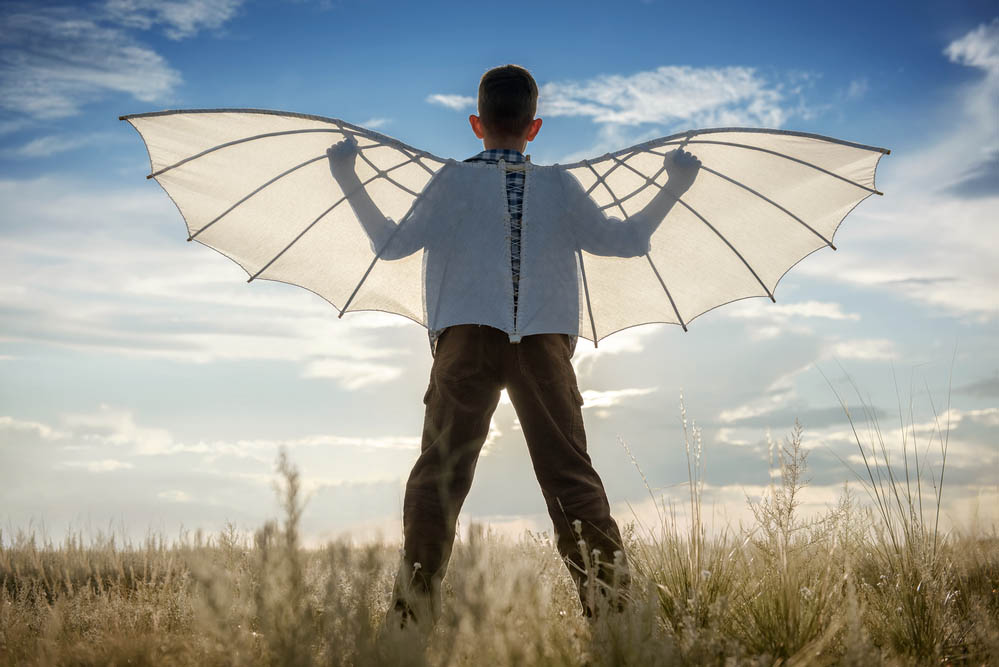
During my 1998 experiences, those lyrics were quite helpful to me. I would even call my experiences a clash between what we call reality (this physical realm) and whatever else is out there, another realm consisting of energy and essence beyond the limitations of this physical world.
I definitely caught a glimpse of something beyond the noise and confusion of this physical world. Those lyrics describe quite well the process or at least attempt of the Self or soul during a breakdown/breakout/awakening to break beyond this realm. There is value to such a process.
Beginning in the early 1980s, my mom studied A Course in Miracles. She would sometimes state one of the primary concepts is that this physical realm is an illusion. Though I kind of grasped that concept, I didn’t fully understand it until I endured the mental breakdown and ego collapse in 1998.
In the months following the initial break in March, I noticed multiple classic rock songs that mentioned “illusion” and “reality.” My mom didn’t listen to music except when driving, and even then, she didn’t pay close attention to what was playing.
In late 1998, I tried to explain to my mom that A Course in Miracles wasn’t the only entity calling into question what is illusion and what is reality. Musicians have been doing that for decades. I pointed out that even the Beatles stated in their song “Strawberry Fields” that “Nothing is real, nothing to get hung about.”
Beatles music is the foundation of my psyche. My middle brother, Jeff, was nine years older than me and was a huge Beatles fan. He played their music all the time when I was a baby and toddler. Years later, Mom said that the Beatles were like a religion to my brother. I agreed.
I also read to her the opening lyrics of “Carry on Wayward Son.” The reference to “beyond this illusion” resonated strongly with her.
When I first became familiar with the song in the mid-1990s, I associated it to my brother, Jeff. In 1990, Jeff left and in time became homeless. I don’t remember the last time I saw him nor spoke with him. When listening to the song, I thought of my brother as a “wayward son.” He died in Las Vegas, Nevada, in May, 1999. I learned later that the name, Jeffrey, is derived from Old German. Many scholars believe that the second syllable, “frey,” is related to the German word Fried, which means “peace.” So even his name ties in with the wayward son making a journey that results in peace.
My mom was pretty impressed with those lyrics. In about 2000, she even asked me to print out the lyrics for her. I don’t recall if she explicitly said that Jeff was her wayward son, but I know the song brought her comfort. In the following years, we often traveled together. Sometimes she would ask me to play “that wayward song.” After my mom walked on in 2019, I found those lyrics in a notebook of special cards and items that she saved.
Back in June of this year, I woke up thinking about One Flew Over the Cuckoo’s Nest and “Carry on Wayward Son.” I realized that they both addressed a similar concept—trying to rise above chaos and confusion of what is deemed to be the “real world,” this physical world. Whether you call this realm “noise and confusion,” an “illusion,” or a “cuckoo’s nest,” both the song and the book share a similar concept of attempting to fly above or beyond something.
In my own awakening journey, instead of being helped in dealing with that unexpected state of consciousness, I was pushed further away into much darker and more sinister states of consciousness. All along, I knew there was a higher purpose to my experiences, even though I couldn’t describe it at the time.
By mid-May of 1998, in my effort to deal with the added chaos around me, I even said to the universe and my friends on the other side, “I’m going to be the one to fly over this freaking cuckoo’s nest!” And I stated it quite emphatically. I unexpectedly had to explore, and triumph over, levels of consciousness I otherwise wouldn’t have experienced, levels of consciousness I didn’t even know existed.
A couple years ago, I was listening to “Carry on Wayward Son.” I was trying to remember which Greek myth involved the man who wore wings of wax, flew too close to the sun, the wings melted, and the man fell into the sea and drowned. The answer, of course, is the myth of Icarus. Since then, I have associated the song to Icarus, though I am sure my subconscious made that association long ago.
I enjoy stopping at the book boxes where you can leave a book for other people to take or you can take a book or two from the box. Two days after I made the connection between One Flew Over the Cuckoo’s Nest and “Carry on Wayward Son,” I was driving across town and came across a book box that I hadn’t seen before. I, of course, stopped to peruse the contents.
Even before I opened the door of the box, I noticed through the glass window that there was a book by Louise Penny. Though the author’s last name is spelled differently than my first name, I smiled.
I opened the door and then noticed the book next to the Louise Penny book. The author’s first name was Jeff. As I saw Penny and Jeff side-by-side, I thought, Hmm, that’s a nice connection. I kind of like that. I noticed that two books further to the left was a book of Shakespeare’s sonnets.
The Shakespeare book also tied back to the experience in 1998 due to Shakespeare’s quote, “All the world’s a stage, and all the men and women merely players; they have their exits and their entrances, and one man in his time plays many parts.” I thought of that quote in the 1998 awakening period. Prior to the breakdown, I was acting in roles that pleased other people. During that breakdown period, I had to act sane—at least try to act as sane as I could—because I still had to try to function in this realm, although I was experiencing something well beyond it. I felt like I was trapped in a movie with no script, and I had to act my way out of a variety of scenes. No script. No cue cards. One take.
The book to the left of the Shakespeare book was an old paperback book. The binding was so worn that I couldn’t read the title. Initially, I skipped past the book. Later, I looked at it more closely. I smiled as I recognized the title—One Flew Over the Cuckoo’s Nest.
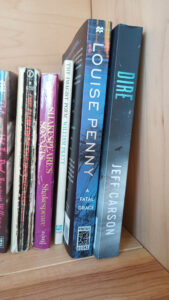
That caught my attention. I thought, Nice touch. I haven’t seen a copy of that in a while. Of course, putting it in the larger context of thinking about it just a couple days earlier made me smile. OK, and kind of wince a little.
I then scanned the other books. I chuckled when I saw one titled The Healing Moment. That breakdown was really an attempt to break out of the toxic systems and trauma that I had internalized so that I could get to a place to heal. There was another book called Blindsided. That breakout experience definitely blindsided me. I was enjoying the collection of book titles that tied together in a meaningful way, at least for me.
Since I recently made the connection between One Flew Over the Cuckoo’s Nest and “Carry on Wayward Son,” I thought to the universe, OK, when am I going to hear the song? That is just how my world works. I figured that as I continued to run errands around town over the next hour or two, I would turn on the car and hear the song.
Only I didn’t. I heard songs that I associate to my friends, Nikos and Kerin. They were the two friends who died at a young age and whose souls I felt during the initial breakdown in Banff in 1998. But not “Carry on Wayward Son.”
As I continued enjoying my morning, I stopped into our local music store. The store includes both new and used albums. I enjoy looking through the used albums to see if there is anything there I can’t live without.
Flipping through the albums, I noticed Lionel Richie’s album Can’t Slow Down. To most people, that wouldn’t be significant, but I knew that album includes the song “Penny Lover,” another reference to my name. Yet another “Penny” that I came across that morning.
I continued to flip through the used albums, smiling as I noticed other albums that had significant meaning to me. I stopped and pursed my lips as I noticed an album I had never seen before by the Paul Winter Consort.
The album’s title?
Icarus.
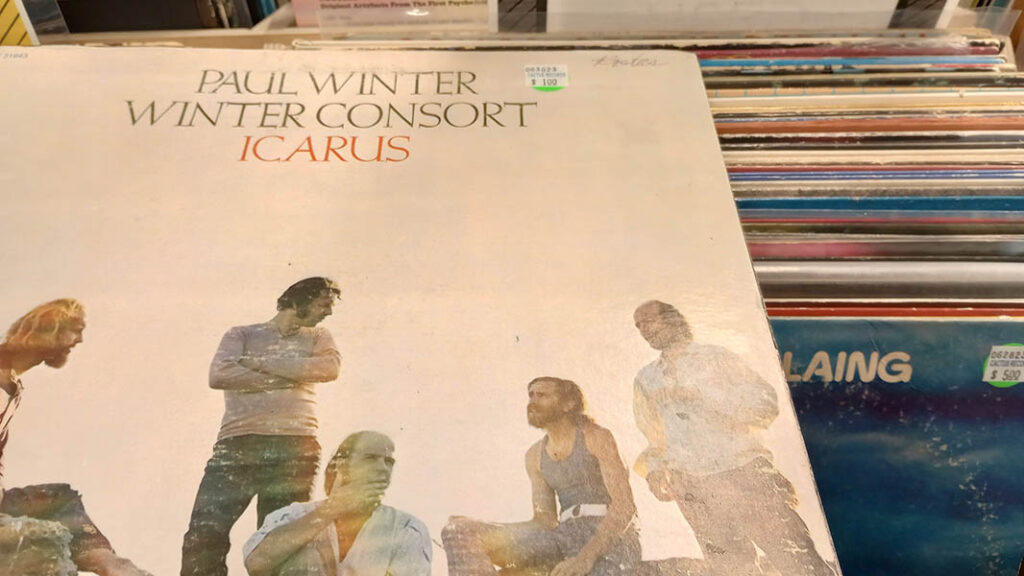
I was duly impressed. Here I was keeping an ear out for “Carry on Wayward Son” and its opening lyric that seems to indirectly describe Icarus, and instead, I came across a direct reference to Icarus. That was so much better.
Well played, Universe, well played.
The album cost only a dollar, so I decided to buy it. For now, I keep it with the worn version of One Flew Over the Cuckoo’s Nest.
Coming across that album, one that I’d never heard of, in that context made for a much better story than I was expecting. Great scene in the movie I call my life.
Since I own the Kansas album, Leftoverture, which includes the song “Carry On, Wayward Son,” I can listen to the song whenever I want. Of course, the song’s lyrics are masculine, speaking about a “son.” Since I am a woman, a few years ago I rewrote the chorus:
Carry on, wayward daughter,
When you’re done, there will be laughter,
Lay your weary head to rest,
Don’t you cry no more.
I hope this story brought you some peace, and maybe even some laughter. I have long said that if my life is a movie, it has some really weird scriptwriters. I have also said that it has an excellent soundtrack. And now I have yet another album and story that has a deeper meaning, at least to me.
And that is the key element of synchronicity and sequencity—that element of “similar meaning.” The meaning involved is often much deeper and more personal than other people will recognize. And that is why I consider synchronicity and sequencity connections to be gifts. I know there are people who will only see such stories as “coincidences.” That tells me quite a bit about them. The meaning I get from such experiences certainly enriches my life. Since my name is Penni/penny, I even enjoy the connection that the word “coincidence” begins with the word “coin.”
Final note: I also chuckled when I later realized that I found the book and album on July 1—Canada Day. That, of course, reminded me of my adventures in Banff, Canada, all those years ago when metaphorically, I flew higher than I knew I could.


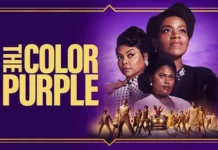
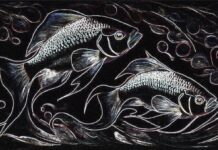











I have always enjoyed the synchronicities and sequencities in my life. Just wanted you to know that just a few days ago I saw (wait for it) the Paul Winter Consort perform live, one of their annual solstice concerts. My eyes always fill when they play “Icarus,” an exhalting piece that I walked down the (grassy) aisle to at my wedding.
Report comment
Love it. I laughed out loud when I read your comment!
Report comment